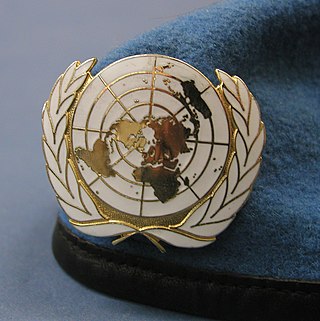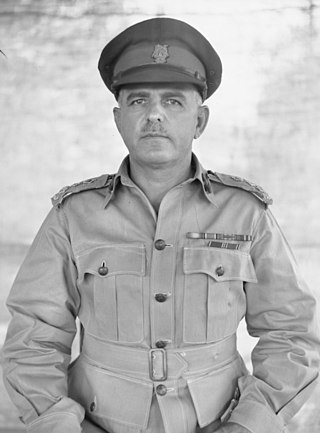
The United Nations Truce Supervision Organization (UNTSO) is an organization founded on 29 May 1948 for peacekeeping in the Middle East. Established amidst the 1948 Arab–Israeli War, its primary task was initially to provide the military command structure to the peacekeeping forces in the Middle East to enable the peacekeepers to observe and maintain the ceasefire, and in assisting the parties to the Armistice Agreements in the supervision of the application and observance of the terms of those Agreements. The organization's structure and role has evolved over time as a result of the various conflicts in the region and at times UNTSO personnel have been used to rapidly deploy to other areas of the Middle East in support of other United Nations operations. The command structure of the UNTSO was maintained to cover the later peacekeeping organisations of the United Nations Disengagement Observer Force (UNDOF) and the United Nations Interim Force in Lebanon (UNIFIL) to which UNTSO continues to provide military observers.

The Indo-Pakistani war of 1947–1948, also known as the first Kashmir war, was a war fought between India and Pakistan over the princely state of Jammu and Kashmir from 1947 to 1948. It was the first of four Indo-Pakistani wars between the two newly independent nations. Pakistan precipitated the war a few weeks after its independence by launching tribal lashkar (militias) from Waziristan, in an effort to capture Kashmir and to preempt the possibility of its ruler joining India.

The United Nations Observer Mission in Georgia (UNOMIG) was established by United Nations Security Council Resolution 858 on 24 August 1993 to verify compliance with a 27 July 1993 ceasefire agreement between the Republic of Georgia and forces in Abkhazia with special attention given to the situation in the city of Sukhumi, Georgia. It was also to investigate reports of ceasefire violations, attempt to resolve such incidents with the parties involved, and to report to the Secretary-General of the United Nations on the implementation of its mandate. 88 military advisors were authorized to be deployed to the region. It ended on 15 June 2009, when Russia vetoed an extension of the mission. The last observers left the region on 15 July 2009.

A ceasefire, also spelled cease fire, is a stoppage of a war in which each side agrees with the other to suspend aggressive actions often due to mediation by a third party. Ceasefires may be between state actors or involve non-state actors.

The United Nations Organization Stabilization Mission in the Democratic Republic of the Congo or MONUSCO is a United Nations peacekeeping force in the Democratic Republic of the Congo (DRC) which was established by the United Nations Security Council in resolutions 1279 (1999) and 1291 (2000) to monitor the peace process of the Second Congo War, though much of its focus subsequently turned to the Ituri conflict, the Kivu conflict and the Dongo conflict. The mission was known as the United Nations Mission in the Democratic Republic of Congo or MONUC, an acronym of its French name Mission de l'Organisation des Nations Unies en République démocratique du Congo, until 2010.
The Karachi Agreement of 1949 was signed by the military representatives of India and Pakistan, supervised by the United Nations Commission for India and Pakistan, establishing a cease-fire line in Kashmir following the Indo-Pakistani War of 1947. It established a cease-fire line which has been monitored by United Nations observers from the United Nations since then.

The United Nations has played an advisory role in maintaining peace and order in the Kashmir region soon after the independence and partition of British India into the dominions of Pakistan and India in 1947, when a dispute erupted between the two new States on the question of accession over the princely state of Jammu and Kashmir. India took this matter to the UN Security Council, which passed resolution 39 (1948) and established the United Nations Commission for India and Pakistan (UNCIP) to investigate the issues and mediate between the two new countries. Following the cease-fire of hostilities, it also established the United Nations Military Observer Group in India and Pakistan (UNMOGIP) to monitor the cease-fire line.

The Department of Peace Operations (DPO) is a department of the United Nations charged with the planning, preparation, management, and direction of UN peacekeeping operations. Previously known as the Department of Peacekeeping Operations (DPKO), it was created in 1992 as part of a restructuring of the UN's peace and security apparatus. The DPO retains the core functions and responsibilities of its predecessor, with a greater emphasis on cohesion, integrating different resources and knowledge, and promoting human rights.

Lieutenant General Robert Harold Nimmo, was a senior Australian Army officer who served in World War I, in World War II, with the British Commonwealth Occupation Force in Japan, as general officer commanding (GOC) Northern Command in Australia, and finally as the chief military observer of the United Nations Military Observer Group in India and Pakistan from 1950 until his death in 1966. Raised on a sheep station in far north Queensland, Nimmo attended the Southport School in southern Queensland before entering the Royal Military College, Duntroon, in 1912. He was the senior cadet of his class, graduating early to participate in World War I. He served with the 5th Light Horse Regiment during the Gallipoli and Sinai and Palestine campaigns, reaching the rank of major. He was praised for his leadership as a light horse squadron commander and for his skills as the brigade major of the 1st Light Horse Brigade in the final stages of the war.

The Siachen conflict, sometimes referred to as the Siachen Glacier conflict or the Siachen War, was a military conflict between India and Pakistan over the disputed 1,000-square-mile (2,600 km2) Siachen Glacier region in Kashmir. The conflict was started in 1984 by India's successful capture of the Siachen Glacier as part of Operation Meghdoot, and continued with Operation Rajiv in 1987. India took control of the 70-kilometre-long (43 mi) Siachen Glacier and its tributary glaciers, as well as all the main passes and heights of the Saltoro Ridge immediately west of the glacier, including Sia La, Bilafond La, and Gyong La. Pakistan controls the glacial valleys immediately west of the Saltoro Ridge. A cease-fire went into effect in 2003, but both sides maintain a heavy military presence in the area. The conflict has resulted in thousands of deaths, mostly due to natural hazards. External commentators have characterized it as pointless, given the perceived uselessness of the territory, and indicative of bitter stubbornness on both sides.

United Nations Security Council Resolution 47, adopted on 21 April 1948, concerns the resolution of the Kashmir conflict. After hearing arguments from both India and Pakistan, the Council increased the size of the UN Commission created by the former Resolution 39 to five members, instructed the Commission to go to the subcontinent and help the governments of India and Pakistan restore peace and order to the region and prepare for a plebiscite to decide the fate of Kashmir.

Pakistan has served in 46 United Nations peacekeeping missions in 29 countries around the world. As of 2023, United Nations (UN) statistics show that 168 Pakistani UN peacekeepers have been killed since 1948. The biggest Pakistani loss occurred on 5 June 1993 in Mogadishu. Pakistan joined the United Nations on 30 September 1947, despite opposition from Afghanistan because of the Durand Line issue. The Pakistan Armed Forces are the fifth largest contributor of troops towards UN peacekeeping efforts, behind India and Rwanda.
The United Nations Peacekeeping efforts began in 1948. Its first activity was in the Middle East to observe and maintain the ceasefire during the 1948 Arab–Israeli War. Since then, United Nations peacekeepers have taken part in a total of 72 missions around the globe, 12 of which continue today. The peacekeeping force as a whole received the Nobel Peace Prize in 1988.
The Mixed Armistice Commissions (MAC) is an organisation for monitoring the ceasefire along the lines set by the General Armistice Agreements. It was composed of United Nations Military Observers and was part of the United Nations Truce Supervision Organization peacekeeping force in the Middle East. The MAC comprised on four sections to monitor each of the four truce agreements, the Hashemite Kingdom of Jordan/Israel MAC, the Israel/Syrian MAC, the Israel/Lebanon MAC and the Egypt/Israel MAC. The various MACs were located on the cease fire lines and, through close liaison with headquarters in Jerusalem, were charged with supervising the truce, investigating border incidents, and taking remedial action to prevent the recurrence of such incidents.
United Nations Security Council resolution 1291, adopted unanimously on 24 February 2000, after recalling resolutions 1234 (1999), 1258 (1999), 1273 (1999) and 1279 (1999) on situation in the Democratic Republic of the Congo, the Council expanded the United Nations Mission in the Democratic Republic of Congo (MONUC) to include additional tasks and extended its mandate until 31 August 2000.
Pakistan officially joined the United Nations (UN) on 30 September 1947 just over a month after it came into existence. Today, it is a charter member and participates in all of the UN's specialised agencies and organisations. Pakistan has been elected seven times into the UN Security Council, with the most recent term in 2013. It is also one of the countries which has had a diplomat, Muhammad Zafarullah Khan, serve a term as the President of the United Nations General Assembly.

The Kofi Annan peace plan for Syria or the six-point peace plan for Syria was launched in March 2012 by the Arab League and the United Nations (UN), when the violent Syrian conflict or civil war had raged for a year.
The United Kingdom began a military intervention in Sierra Leone on 7 May 2000 under the codename Operation Palliser. Although small numbers of British personnel had been deployed previously, Palliser was the first large-scale intervention by British forces in the Sierra Leone Civil War. In early May 2000, the Revolutionary United Front (RUF)—one of the main parties to the civil war—advanced on the country's capital, Freetown, prompting the British government to dispatch an "Operational Reconnaissance and Liaison Team" (ORLT) to prepare to evacuate foreign citizens. On 6 May, the RUF blocked the road connecting Freetown to the country's main airport, Lungi. The next day, British soldiers began to secure the airport and other areas essential to an evacuation. The majority of those who wished to leave were evacuated within the first two days of the operation, but many chose to stay following the arrival of British forces.

The 2014–2015 India–Pakistan border skirmishes were a series of armed clashes and exchanges of gunfire between the Indian Border Security Force and the Pakistan Rangers: the paramilitary gendarmerie forces of both nations, responsible for patrolling the India-Pakistan border) along the Line of Control (LoC) in the disputed Kashmir region and the borders of the Punjab. Tensions began in mid-July 2014, with both countries' military officials and media reports giving different accounts of the incidents and accusing each other of initiating the hostilities. The incident sparked outrage in both countries and harsh reactions by the Indian and Pakistani militaries and the Indian and Pakistani governments.

The United Nations Military Observer Group in India and Pakistan (UNMOGIP), was established by the United Nations Security Council in 1949 to observe the ceasefire between India and Pakistan in the Kashmir region.











